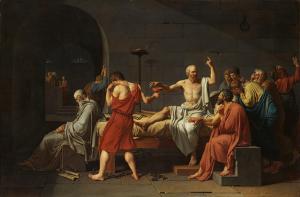Here is a proposed general rule for a first read on new books, a first viewing of a film (or even evaluating a “worldview”!):
Praise the good, lest some vice, a hidden prejudice, cause us to condemn as bad something that merely makes us uncomfortable.
This year I read a great many good books, some again, many for the first time, and more than one very bad book. Some were badly argued. One had a thesis where one could easily have argued the opposite if one used the same level of specificity as the original. There were a few good movies, fun films, some great books, and also stinkers galore this year.
Or so it seemed to me.
Maybe.
Since I am not paid or required to review films, books, or art for my job, though my work does mandate watching, reading, and looking at many works, there is no necessity for my comments here on any of them! Positive reviews are almost certainly a better use of my time since pointing to good work is helpful to the writer and praising others is (likely) better for my soul than the dubious pleasures of a biting review. I like folk to recommend wonderful books, films, or art and so hope to return the favor. If you are reading here, we may share an enthusiasm for certain types of literature. I suspect the number of Trollope fans here is higher than the national average.
I am presently learning a great deal from Solzhenitsyn and American Culture (edited by David P. Deavel and Jessica Hooten Wilson) and awash in the glory of Shahnameh: The Persian Book of Kings (translation by Dick Davis).
Much more on both titles in time. Of course, as with any general rule, there are exceptions. There are works bad enough whose continued impact is relevant enough that these works deserve immediate criticism. My first read of the arch-racist Thomas Dixon left me nothing to praise and exposing his rotten role in literary history was important. If possible, Thomas Nelson Page, arch-racist and progressive, is worse than Dixon and when I am done with his complete work, putting his ideas in the story of the Progressive Movement is merited. We did not get here from nowhere!
On Particular Bad Books: An Invitation to Charity
Still, a book I dislike, at least one from a serious scholar or thinker should be an invitation to self-examination. Why do I dislike this book? What does it stir in me? Is this prejudice? Is it virtue? Why do others like this book? Is it possible to talk to the author before writing the scathing and dismissive review?*
While always good to reexamine one’s prior assumptions, this is not the only work we should do. If we read an important work like The Book of Mormon that many thoughtful people think inspired, one need not agree with the work, I surely do not, but one must read to understand why decent people do. If one cannot gain this sympathy, then the harder work of persuading people of their error can never be done. I am not a Mormon, but I can understand why some brilliant, decent people wish to be. I have considered, as best I could, the claims of The Book of Mormon, see the brilliance, but came to reject the central message. This is harder than a Mark Twain riposte or Conan Doyle’s bigotry, but it is better for the soul and for the world.
What to do? When I read a very bad take, especially one from Evangelical publishers (often my publishers!), I have learned (at cost!) to stop, think about it, do not review it. I revisit my assumptions, then try to understand what is good, true, and beautiful in this book. I read positive reviews. If the book seems important enough, after time the text is still being read, the movie watched, then I might review. The times I have not followed this rule, my opinions have been less charitable, my understanding less clear, and my arguments not as persuasive.
Most of all, in the end, one must tell the truth and never lie. Some of these truths are very important to me: Jesus is Lord, abortion is murder, white supremacy is sin, injustice to the poor is hateful to God, and coveting the wealth of the rich wrong.
This year there was a boatload of political books written by historians, sociologists, politicians, and theologians. I read scores and reviewed few, since few seemed to have enduring value. We shall see. When time passes, I will know if I should revisit some of these. Patience with a bad book shows when the bad book deserves criticism.
On So Called Bad General Cultural Events: the Worldview
This principle applied to particular cultural artifacts has served me well, but can be applied to movements as well.
There was a time when people at conferences asked me about “post-modernism.” There were some particular ideas they associated with post-modernism that I thought bad and said so, but I always was unclear that there was a definable thing to condemn called “post-modernism.” There were certainly philosophers, some very difficult to understand, who discussed post-modernity but any two seemed to disagree with each other as often as they agreed. As a result, I was skeptical that there was a “thing” called “post-modernism” that should be the subject of very much analysis . . . and certainly not by me with my background in analytic philosophy. It seemed easier to oppose bad ideas when they came up in detail and not try to generalize too much.
I certainly have never understood panic as a mode of engagement. Perfect love casts out fear. We can argue, even scrap, but with love for our neighbor and every attempt to be charitable to what we take to be bad ideas. Charity toward our ideological enemy is hard, but necessary if bad ideas are to be defeated without destroying the good ideas around them. Woodrow Wilson was one of our worst presidents, but he also brought needed social changes mixed up in the bad. Pulling apart the good and the bad, and examining my own assumptions about what is good and bad while doing so is work that takes time.
A negative quick take is too often merely a justified dislike of obvious bad ideas. Wilson’s scientific racism is repulsive. His worship of progressive pieties is unattractive to me, but that is not enough to dismiss eight years of pivotal history. He was no great friend of votes for women, but he did not stand in the way of this great, unchanging bit of progress. There is a laziness in taking easy dismissive shots.
The hard work of seeing what is good in Homer, pagan, polytheist, describing a hopeless world (at least in Iliad) shows that we can learn a great deal from those who are otherwise wrong. Saint Basil, no liberal he, taught us this approach. What is good for Homer is surely doubly good for any American thinker with whom we have disagreement. There is much to be gained from reading Malcolm X with an open mind and heart.
An aversion to generalization (“this did that because of this”) and uncharitable reads of movements and thinkers that fit a convenient ideological framework is easy to see in those whose ideas I generally dislike, but what of myself? As a result, I should be careful to understand, ask questions directly when I can, and gain whatever good I can from any view. Socialism strikes me as a very bad idea, but there are reasons Orthodox Christians have been socialists! What are they? How can I understand them? What, if anything, can I learn?
This will not keep us from arguing against bad takes or giving opinions. We might, however, be kept from condemning a mistaken notion of something we do not (yet) understand or merely reflecting our prejudices.













